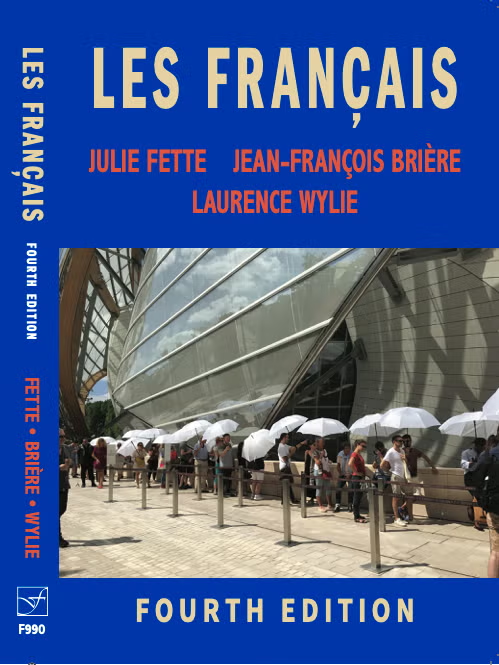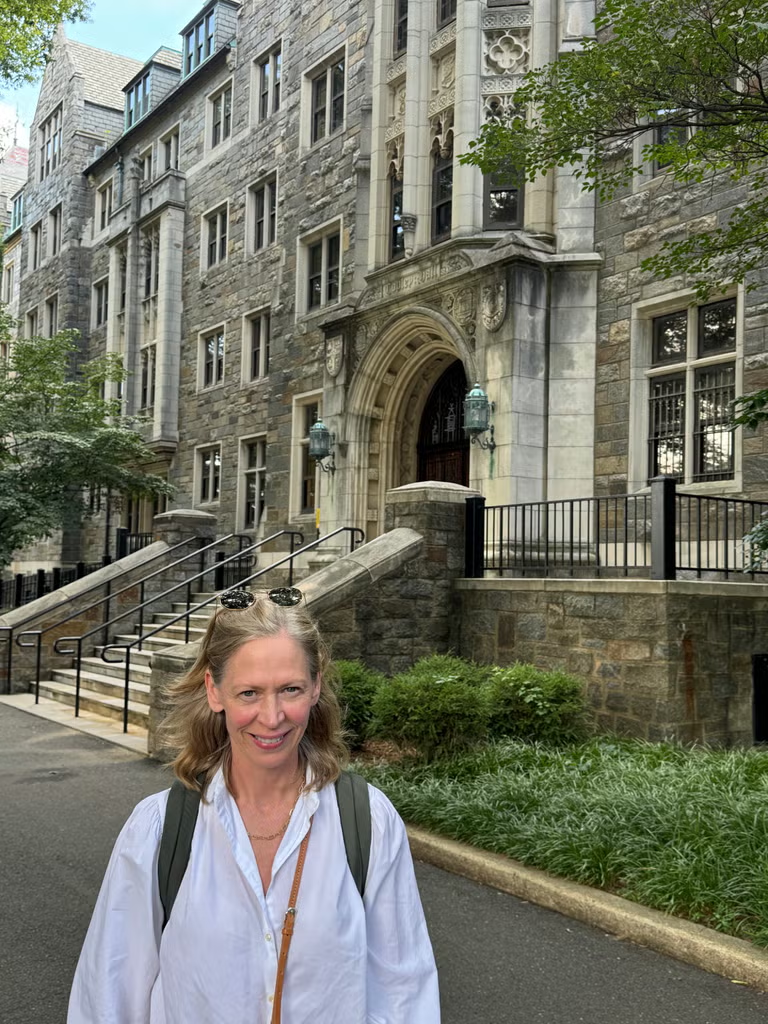In the spring semester, as many SFS students were finalizing their summer internship plans, the job market in Washington, DC, was undergoing seismic changes as the Trump Administration rapidly reduced the federal government workforce by 300,000 workers. When her summer internship at the U.S. Department of State was cancelled, Talia Martin (SFS’27) became one of those affected. From Houston, Texas, and majoring in international politics at SFS with a minor in French and Francophone studies, Martin has a longstanding and deep interest in both the French language and French culture. Looking for a pivot for her summer, Martin connected with SFS alumna Julie Fette (SFS’89), associate professor of French studies at Rice University.
“Knowing she was an SFS student with a minor in French, I asked her to manage a translation of a popular textbook used in North American university classrooms, Les Français, which I co-authored,” Fette says. “The book explains French society in all its interdisciplinary aspects: politics, the economy, foreign policy, education, religion, media, etc. It is published in French, but this fall, I need a version in English to teach non-French-speaking Rice University students who will be living in France for the first time.”

Martin had previously studied abroad in France through Georgetown’s Summer in Tours and Paris program, but her work with Fette gave her new insight on the country: “By reading and discussing chapters of the book with Julie, I gained new insights and perspectives on French culture and politics compared to American lifestyles. For example, I had never looked in depth into how differences in body language, gestures and social interactions reveal variations in norms and values between the two cultures.”
Martin felt prepared by her studies at Georgetown to understand the material of the textbook and complete the project.

“My language skills and knowledge of French culture, honed by studying abroad through the Georgetown program in Tours and Paris, were the most valuable assets to my work. I’m looking forward to studying abroad in Rabat, Morocco in the fall, where I hope to use my French skills to expand my knowledge of Francophone countries,” she says.
Learning about the nuances of translation also gave Martin perspective on potential shortcomings in AI translation tools: “In French, the pronoun ‘on’ can be used to make a general statement, refer to a group, or mention an unspecified individual; therefore, when translating a French sentence with ‘on’ into English, it’s necessary to have a contextual comprehension of the original French sentence. Given these nuances, AI tools lack the skills that a French speaker needs to translate a text correctly.”
SFS from 1989 to 2025
Many things may have changed about SFS since Fette graduated in 1989, from the number of majors available to the method of language study, but for Fette, the opportunity to work with Martin on her project was a delight.
“In the past, we had separate French classes just for SFS majors; we read no literature but instead debated policy and national security in French,” Fette says. “If she [Martin] is representative of current SFS students, the school is doing an excellent job of educating deep thinkers.”

Fette didn’t plan to have a career as an academic when she was a student: “As an undergraduate, I wanted to be a diplomat or a spy, but it was impossible to get a first posting at the Paris embassy and I’m terrible at lying.”
She then considered law school, but after a stint as a legal assistant for a New York law firm in Paris, Fette decided corporate law was not for her.
“Ultimately, I decided that it would be a privilege to be paid to read books, so I signed up for a doctorate and pursued a career in academia,” she says.
A career in academia
The interdisciplinary background at SFS prepared Fette for the field: “As a specialist of French studies, I consider myself a historian, sociologist, political scientist and anthropologist all at the same time. The multiple social sciences that I was exposed to at SFS prepared me to be comfortable managing various disciplines.”
Fette finds her work exposing students to French culture to be very rewarding. “As a university professor, I find great meaning in intellectual projects that interrogate our human condition, such as the roots of discrimination. Why we differentiate amongst ourselves and exclude others because of religion, nationality and gender is a question that drives my research,” she says.

Drawing from her own experience as a member of the bicentennial class, “the very last to be trained during and for the Cold War,” Fette advises current students that change is a constant: “Months after graduation, the Berlin Wall fell, and almost everything we studied—containment, the iron curtain, mutually assured destruction—suddenly became ‘history!’ Much remained relevant, however, for example, our ability to think critically in rapidly changing circumstances, something Dean Andrew Steigman’s adrenaline-fueled role-play exercises taught us in the classroom.”
For any career path, Fette urges students to seek out mentors and focus on languages. For those interested in an academic career, she welcomes students to reach out to her directly!
For her part, getting to know Fette was one of Martin’s favorite parts of the project: “I am consistently impressed by the SFS alumni community. Julie was both generous with her time and insightful when talking with me about education and potential career paths. Getting to know her, while gaining translation experience and helpful advice, was one of the best aspects of working together.”
